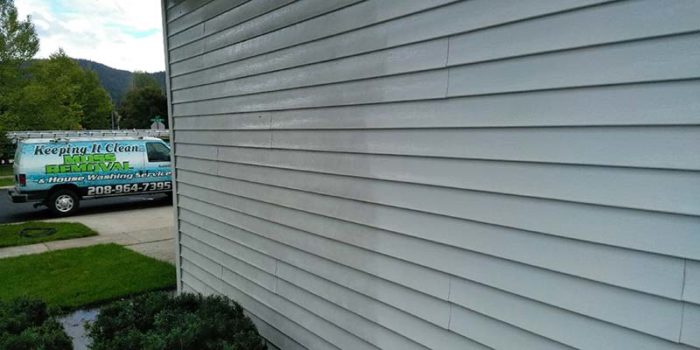Sooner or later, every exterior surface of your home needs pressure washing. Mildew, mold, dirt and grime build up over time, damaging the outside (and possibly the inside) of your home or business. Pressure washing is the best solution for dislodging deeply ingrained dirt and mildew, restoring the original luster of your exteriors, and lengthening the life of your paint job.
Why You Should Pressure Wash Your Home or Business
Everyday homeowners and businesses spend thousands of dollars on professional paint jobs for their homes and storefronts, but those same home and business owners often overlook professional pressure washing that will maintain the life of that very paint. Pressure washing removes dirt, grime, mildew, mold and other buildup that destroys paint and eats away at the exterior of your home or business. Professional pressure washing can extend the life of a paint job up to ten years.
Over time, mildew, mold, and moss can cause:
- Shingle Deterioration
- Roof Leakage
- Paint Erosion
- Wood Rot
- Structural Instability
- Improper Water Drainage
- Flooding
- Bacterial Intrusion
All of these problems can be avoided by scheduling an annual pressure washing. Don’t wait until moss, mold, and mildew have eaten through your paint or vinyl siding eroded the protective oil on your shingles, and infested the interior structure of your home. It is much cheaper to hire a professional pressure washing service than to fix the damage done by moss, mold, and mildew.
What Can You Pressure Wash?
Professional pressure washing is mostly used for the exterior of homes and businesses, as well as patios, docks, roofs, sidewalks and driveways. However, pressure washing can be used to clean a wide array of things around your home or business.
Most Common Uses for Pressure Washing:
- Home Exteriors
- Roofs
- Fencing
- Patios and Decks
- Driveways and Walkways
- Docks
- Barbecue Grilles
- Garage Floors
- Front Entrances and Stairs
- Outdoor Gear (Bikes, Boats, Canoes, etc.)
- Lawn Mowers
- Patio Furniture
Please note that pressure washing can damage all of the items listed above if not handled properly.
What to Expect When Hiring a Professional Pressure Washing Service
When you hire a professional pressure washing service, it is good to know what you can expect and what you should look for. Many homeowners mistakenly assume that you can get the same results with a garden hose that you can with professional pressure washing equipment, but this simply isn’t the case. So if you’re going to pay good money to hire a pro, it’s worth knowing what you’re getting in return.
Home or Business Evaluation
A professional pressure washing service should properly evaluate the needs of your home or business. Pressure washing is not a one-size-fits-all solution. The psi and waterflow used to remove moss from one surface may very well damage a different surface altogether. A professional will inspect your home or business and know exactly the amount of pressure to use on the various surfaces, the proper cleaners that can be utilized, and the correct water rotation to ensure that no damage is done to your structure.
Environmentally Friendly Cleaning Products
Many people assume that bleach is the best cleaning product and can be used in every pressure washing situation. This is a serious mistake. Bleach and other common cleaning solutions can cause deterioration to various surfaces as well as kill off the surrounding vegetation. A professional pressure washing service should always utilize environmentally friendly cleaning products that don’t harm the greenspace around your home or business.
Effects of Professional Pressure Washing:
- Restore Curb Appeal
- Remove Unsightly Stains
- Wash Away Dirt, Grime, Mildew, and Mold
- Maintain Longevity of Home & Property
- Remove Moss, Lichen, Algae Down to the Root
- Prevent Buildup of Standing Water
- Prevent Rainwater Flooding
Pressure Wash vs Power Wash
Pressure washing and power washing are often confused, as most people assume they are the same thing. And, for the most part, they are. Except for one crucial difference. Pressure washing uses cold water, while power washing uses heated water.
Why the difference? Well, the heat used in power washing makes it a better solution for certain types of cleaning, such as removing grime from commercial concrete patios and walkways. Softer surfaces, such as wood and shingles, can be easily damaged by the combination of high-pressure water and heat, and for those surfaces pressure washing is the way to go.
DIY Pressure Wash: Tips for Cleaning Your Home
If you intend to rent a pressure washer and clean your home yourself, follow the tips below to ensure that you get the best results.
Be Aware of Possible Damage
There are two ways in which you can seriously damage your home if you do your own pressure washing: too much pressure can destroy various surfaces, and harsh cleaning products can cause deterioration and kill surrounding vegetation. If you are uncertain about the proper psi, water rotation, and cleaning products to use for your home, it is best to hire a professional who can do an expert evaluation.
Pressure Washing Pro Tips:
- Test water pressure by filling a five-gallon bucket: if it fills in less than two minutes, you’re good to go
- Experiment with the distance between the pressure washer tip to the surface you intend to clean to find the distance that removes grime but doesn’t cause damage
- Wider tips should be used on softer surfaces, such as wood and shingles, in order to reduce the possibility of damaging those surfaces
- Don’t use chlorine bleach
- For wood surface, move the tip with the grain of the wood
- Know your pressure nozzles: there are different nozzles for different surfaces
- For caked-on gunk, it is best to spray the surface and let it soak for a few minutes, which will make the gunk easier to remove

